Amnesty Calls On Iran To Halt Death Sentences Of Three Tortured Protesters
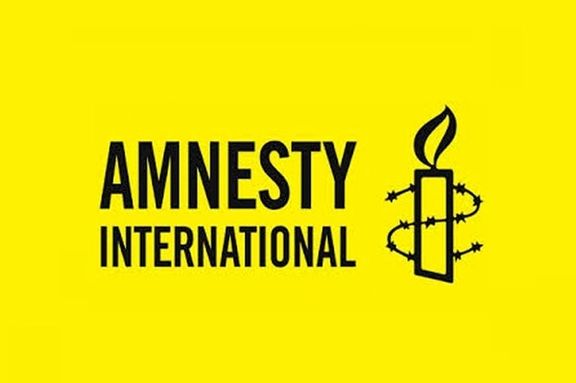
Amnesty International says the Islamic Republic must immediately reverse the convictions and death sentences of three young protesters who were subjected to torture.

Amnesty International says the Islamic Republic must immediately reverse the convictions and death sentences of three young protesters who were subjected to torture.
The international human rights group said on Friday that the three protesters were tortured by “floggings, electric shocks, being hung upside down and death threats at gunpoint.”
Amnesty has also learned that Revolutionary Guard agents raped one of them and sexually tortured another by placing ice on his testicles for two days.
Arshia Takdastan, 18, Mehdi Mohammadifard, 19, and Javad Rouhi, 31, each received two death sentences in December 2022 for “war against God” and “corruption on earth”.
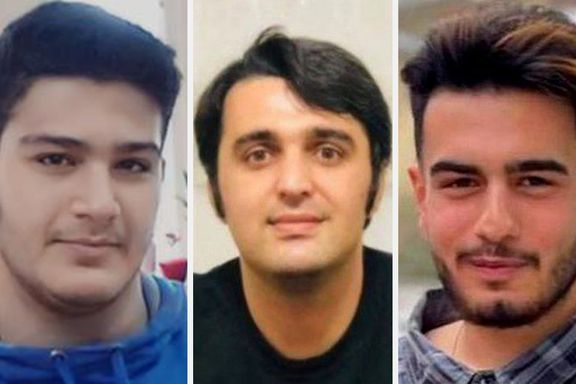
The court says the young men have “incited” arson by throwing headscarves into bonfires during protests in Noshahr, in northern Manzandaran province on September 21.
Javad Rouhi has received the third death sentence as he has confessed under duress that he burned a copy of the Quran during protests.
“The fact that Arshia Takdastan, Mehdi Mohammadifard and Javad Rouhi and their anguished relatives live under the shadow of execution while Revolutionary Guard agents and prosecution officials reasonably suspected of responsibility or complicity in their sexual abuse and other forms of torture enjoy absolute impunity highlights the sheer cruelty and inhumanity of Iran’s judicial system,” noted Diana Eltahawy, Amnesty International’s Deputy Director.
“The Iranian authorities must immediately quash the convictions and death sentences of these young men and drop all charges related to their peaceful participation in protests,” she added.

The US charged three men with conspiring to assassinate a New-York based dissident Iranian activist and journalist, the Justice Department announced Friday.
Prosecutors have charged three members of an Eastern European criminal organization with ties to Iran's government with conspiring to assassinate a journalist and activist who is an American citizen, Attorney General Merrick Garland said on Friday.
Rafat Amirov, Polad Omarov and Khalid Mehdiyev were charged with murder-for-hire and money laundering for their role in the thwarted Tehran-backed plot, the Department of Justice said in a statement.
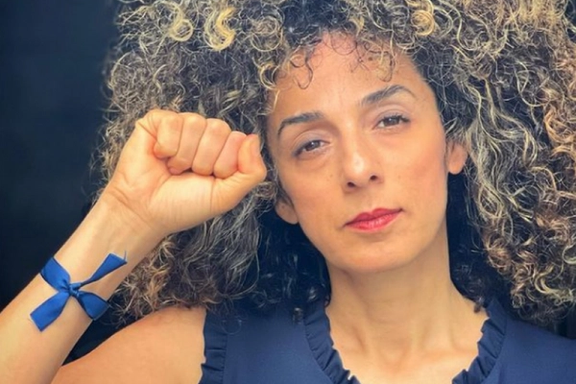
"The victim publicized (the) Iranian government's human rights abuses, discriminatory treatment of women, suppression of democratic participation and expression and use of arbitrary imprisonment, torture and execution," Garland said.
Garland did not name the alleged victim, but Mehdiyev was arrested last year in New York for having a rifle outside the Brooklyn home of journalist Masih Alinejad, a longtime critic of Iran's forced hijab laws who has promoted videos of women violating those laws on social media.
Alinejad has also emerged as a prominent representative of the protest movement that has posed the most serious challenge to the Islamic Republic in its 44-year history.
The female activist was the target of an earlier plot in 2021, when US law enforcement informed her of an Iranian plot to kidnap her and take her to Venezuela for eventual transfer to Iran, where she should have faced certain execution.
"This is the second time in the past two years that this Office and our partners at the FBI have disrupted plots originating from within Iran to kidnap or kill this victim for the ‘crime’ of exercising the right to free speech, to independent political thought, and to advocating for the rights of the oppressed and disenfranchised inside Iran," US Attorney Damian Williams said.
Iran has assassinated or kidnapped hundreds of opponents abroad in its four-decade history. Germany, France, Turkey and Iraq were among countries where Iranian intelligence conducted many deadly operations against opponents.
Amirov was arrested on Thursday and will have a pretrial hearing in federal court in Manhattan later on Friday. Omarov was arrested in the Czech Republic earlier this month.
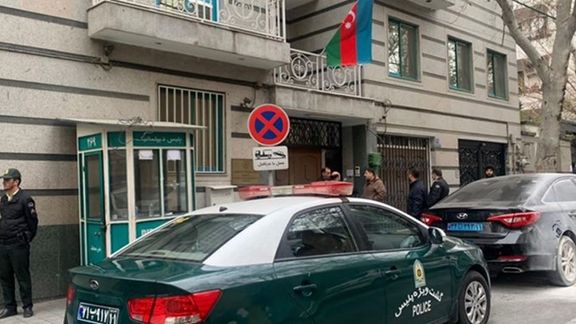
Following an armed attack at the Azerbaijani embassy in Tehran, there are contradictory statement about motives, with Iran personal reasons led to the attack and Azerbaijan hinting at a terrorist act.
Azerbaijan summoned the Iranian ambassador and media in Baku seemed eager to portray the incident as a terror attack, claiming the assailant was a member of the Revolutionary Guard.
Azerbaijani media outlet Trend News Agency reported on Friday that the attacker, who entered the embassy, opened fire and killed the head of the security, was identified as Iranian citizen Yasin Hosseinzadeh.
According to Trend's information, “the perpetrator of the incident, Yasin Hosseinzadeh, is an Iranian citizen, and there are suspicions that he is related to Iran's special services, especially the IRGC,” Trend wrote. It added that Iranian security forces guarding the embassy did not try to stop the attack.
Footage of surveillance cameras released on social media clearly shows that the gunman got out of a car with an AK-47 assault alone and entered the embassy after uttering a few words to the Iranian guard outside. Trend claims that he planned to embark on a killing spree at the embassy before he was neutralized.
Tehran’s police chief said earlier in the day, “This individual today morning entered the Azerbaijani embassy with a gun and opened fire and in this incident one person was killed and two were injured,” adding, “With quick police action the individual was arrested, and an investigation is under way. The person entered the embassy with his two small children. He has indicated that he had personal and family difficulties.” The police claimed he was accompanied by a seven-year-old and a 14-year-old and was looking for his wife who was “hiding” inside the embassy.
However, video footage shows he entered the embassy alone and no children were visible.
Another article in Trend described the terrorist incident as “part of Iran's policy of hostility towards Azerbaijan.” A deputy of the country’s parliament said, "Iranian televisions and radios continuously promote hostility towards Azerbaijan. This once again shows that the Iranian state has a hand in the terrorist incident at the embassy, because it is known that Iran has always been a nest of terrorism and is one of the main countries that support terrorism. The terrorist incident against our embassy proved this once again."
According to the news outlet, “Iranian authorities are trying to avoid a thorough investigation of the attack.”
A couple of hours after the attack, the Islamic Republic’s new police chief Ahmad-Reza Radan announced a new police commander for the capital Tehran: Abas-Ali Mohammadian. A former head of the Law Enforcement Forces in Alborz province, Mohammadian was sanctioned by the EU and UK last year.
Several officials for Azerbaijan and other countries have condemned the attack, urging investigation into the incident and punishment for the perpetrator.
President Ilham Aliyev issued a statement in connection with the terrorist attack, decrying the assault and expressing sympathy with the family of First Lieutenant Orkhan Rizvan oglu Teymurov, who lost his life defending the embassy.
Azerbaijani Foreign Minister Jeyhun Bayramov said, "We strongly condemn the treacherous terrorist attack against the Embassy of Azerbaijan in Iran. We offer our condolences to the family and loved ones of our deceased officer. The perpetrators of the terrorist attack and its customers should be punished as soon as possible,”
Minister of Foreign Affairs of Türkiye Mevlut Cavushoglu also held a phone conversation with his Azerbaijani counterpart, during which he strongly condemned the treacherous terrorist attack.
Following the attack, Italy, Argentina, Belarus, Georgia, Slovakia, and many other countries have been condemning the incident.
Israel's former ambassador to Azerbaijan, Artur Lenk, said this on his Twitter account, "How terrible. I express my deepest condolences to the Ministry of Foreign Affairs of Azerbaijan. Is anyone surprised why this happened in Iran?"
Secretary General of the Council of Europe Marija Pejcinovic Buric said on twitter, "I strongly condemn today’s attack against Azerbaijan’s Embassy in Tehran. Attacks against diplomatic missions are unacceptable. I express my solidarity with Azerbaijan and my condolences for the victims."
Iran’s Foreign Ministry spokesman Nasser Kanaani also condemned the attack, saying, "Upon the order of political and security officials, the issue is being pursued with top priority and sensitivity so that aspects of the incident and the motivation of the attacker become clear."

The United States and Israel concluded their largest-ever joint military drills, with thousands of troops, dozens of aircraft and naval vessels in and around Israel.
The drill, dubbed Juniper Oak 2023 was widely seen as a message to Iran, although US officials said the live-fire exercise did not include mockups of Iranian targets, but large American bombers did take part.
US and Israeli military ties have been expanding in recent months, as both Washington and Jerusalem pledge not to allow the Islamic Republic to acquire nuclear weapons. Negotiations to revive the Iran nuclear deal came to a deadlock last September, as Tehran continues to enrich uranium and is said to have enough fissile material for 3-4 bombs.
IDF chief Herzi Halevi said “Israel and the US share the same values, and the IDF and CENTCOM share the same outlook on the threats facing this region,” adding that the drill “raised our level of planning and implementation of combined operations.”
“Israel is capable of defending itself, but it’s always good to have our greatest partner beside us to learn from one another. This operational partnership strengthens our ability to deal with a wide range of security challenges in the region,” Halevi said in remarks published by the IDF.
“Today the partnership between CENTCOM and the IDF is stronger and continues to grow,” said General Michael Kurilla, the commander of CENTCOM. “Our partnership is a key pillar of our commitment to expanding regional security cooperation,” he added.
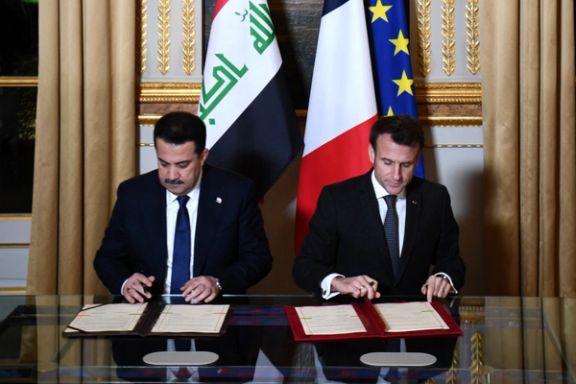
About a month after France called for curbing the Islamic Republic’s influence in Iraq, Paris and Baghdad have signed a strategic cooperation agreement.
French President Emmanuel Macron held a meeting with Iraq Prime Minister Mohammed Shia al-Sudani on Thursday in which they inked a set of strategic agreements meant to boost Baghdad's economic cooperation with Paris, especially in the energy and public transportation sectors.
"I just signed the Strategic Partnership Agreement with my friend Mr. Macron, which sets a roadmap for expanding the horizons of cooperation between our two countries in various fields," read a tweet from the Iraqi PM following his reception by the French president.
In a statement issued in the early hours of Friday, the Elysee Palace said France and Iraq also signed a treaty seeking to strengthen bilateral relations in anti-corruption, security, renewable energy and culture.
"(Macron and Shia al-Sudani) have reaffirmed their commitment to complete big network infrastructure projects based on French knowhow (...) In that respect they have pledged to grant Iraq the expertise of French companies," read the statement, adding that "In terms of alternative energies, they showed their commitment to the implementation of TotalEnergies's multiple-energies project (...) based on solar energy and investments in gas."
Macron in December attended the second gathering of the Baghdad Conference for Cooperation and Partnership in Jordan, which aimed at providing support for Iraq’s stability and security. The summit, which was held on the shores of the Dead Sea, brought together twelve countries of the region, including the archenemies Saudi Arabia and the Islamic Republic. Tehran's policies of intervening in other countries affairs was condemned at the “Baghdad II” summit.

A newspaper in Iran says the parliament's plan to add two new articles to the 'Islamic Penal Code' could further restrict civil liberties and freedom of speech.
According to Etemad newspaper, based on the new legislation, making any comment about the state of affairs in the country can land people in trouble, particularly politicians, political activists and celebrities.
The newspaper said that lawmakers at the Judiciary Committee wish to make sure that all public comments are identical with official version of developments. The headline of Etemad's report said: "Watch your mouth, you might be punished if what you say is different from the official reading!"
The paper said that the motion at the Majles is currently called "Adding one article to Chapter five of the Islamic Penal Code." The report in Etemad further opined that the new legislation may mainly target "well-known and famous" individuals.
The parliament had previously tabled another motion dubbed, "Adding two articles to Chapter five of the Islamic Penal Code," which called for changing articles 499 and 500 of the law. The new article 499 now calls for more severe punishment for those who "insult ethnic or religious minorities with the aim of instigating violence and tension," and the new article 500 intensifies the punishment of "those who commit criminal offenses against law enforcers and government buildings."
The amendments were made in December following months of protests in Iran during which occasional clashes occurred between heavily armed security forces such as the IRGC, police special forces, the Basij militia and plainclothes officers who attacked unarmed protesters.
The new change is about article 512 of the penal code which is about "those who provoke the people in order to disrupt the country's security through instigating war, massacres and civil strife."
The sentence for those who were charged with related offenses was imprisonment for five years, but the new addition is aimed at intensifying the punishment and making it easier for the courts to apply the article on anyone in jail as it is known today by human rights organizations that inmates are made to confess to crimes they have never committed.
The new legislation extends the duration of imprisonment to up to 15 years and also calls for the payment of up to 550 million rials no matter if the act committed "will or will not lead to murder and destruction of property."
Meanwhile, the new addition to the law says, "Anyone with a good job or with a good social standing or anyone who is a cultural, scientific, or military figure, even those with a high standing in their family" might be subjected to the new punishments "if they make a comment prior or contrary to official views about the state of the affairs in the country whether by word of mouth or on social media."
The legislation also warns that in certain cases, such comments might be assessed as "spreading corruption on the Earth," which entails death sentence.
The website of the Iranian parliament has restricted access to this part of the law based on users IP to bar foreigners and Iranians living abroad from accessing it or possibly telling the rest of the world about what Iran is doing to restrict civil liberties. The error message says: "Access denied --The request has been blocked from your IP at your location! This is due to some security settings of the website."
Based on this new legislation, an event such as the murder of Mahsa Amini in police custody should not be discussed on social media or otherwise as long as there is no definitive official attestation. In other words, no one can contradict what the government says about all issues, including for example inflation. A complaint about high prices could be interpreted as instigating unrest.
Mousa Ghazanfarabadi, the chairman of the Majles Judiciary Committee told Etemad that the new legislation is still being reviewed and its aim is to include “fake news, lies and rumors” within the jurisdiction of article 512. He mentioned Mahsa Amini's case and said that anyone makes a comment about the matter which could be categorized as lies, rumors and fake news will be additionally sentenced to up to ten years of deprivation from their social rights, and will be barred from going back to their job.